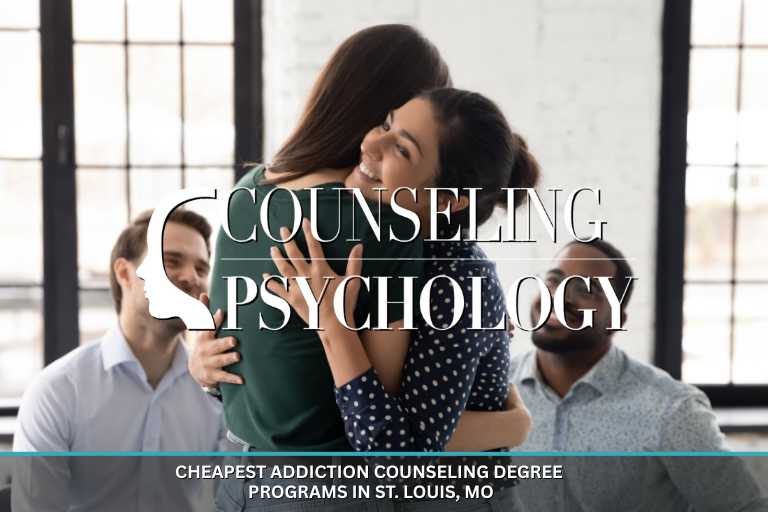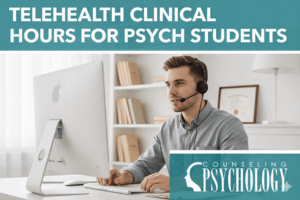Cheapest Addiction Counseling Degree Programs in St. Louis, MO

St. Louis is facing a growing need for qualified addiction counselors. According to the Missouri Department of Mental Health, opioid-related overdose deaths have surged in recent years, particularly in urban centers like St. Louis. As mental health and substance use challenges continue to intersect, the demand for licensed professionals trained in addiction counseling is only expected to grow.
For individuals ready to answer the call, pursuing a master's in addiction counseling can open the door to a stable, impactful career in a field where the work truly matters. Fortunately, prospective students in the region have access to several high-quality, affordable programs that provide both the academic preparation and clinical training needed for licensure and long-term success.
This guide highlights the most cost-effective addiction counseling master's degrees in St. Louis, MO, offering insights into tuition, curricula, licensure alignment, and career outcomes. Whether the goal is to become a Licensed Professional Counselor (LPC) or serve on the front lines of substance use recovery, choosing the right degree program is a foundational step.
2025 Most Affordable Addiction Counseling Programs in St. Louis
Why Choose St. Louis for Addiction Counseling Education?
St. Louis offers a strategic location for students entering the behavioral health field. As a hub for hospitals, nonprofit treatment centers, private practices, and state-run recovery services, the city provides a robust and diverse clinical training environment. Local counseling programs frequently partner with agencies across the metro area to offer internship opportunities that give students exposure to a wide variety of treatment models and client populations.
Graduate students also benefit from Missouri's relatively low cost of living compared to other states, which makes pursuing a degree here even more financially manageable. Affordable housing, lower transportation costs, and access to public services contribute to an overall reduction in student expenses.
In addition to its economic accessibility, St. Louis is home to strong community mental health initiatives. Organizations like Behavioral Health Response and the St. Louis Mental Health Board have played vital roles in expanding behavioral health access across the city. These public-private partnerships often translate into internship placements, job pipelines, and collaborative research opportunities for graduate counseling students.
Accreditation and Licensure: What to Look For
Accreditation and licensure alignment are key factors in selecting a graduate program in addiction counseling. In Missouri, licensure as a Licensed Professional Counselor (LPC) or Licensed Addiction Counselor (LAC) requires graduation from a regionally accredited institution. Programs should meet the standards set by the Missouri Committee for Professional Counselors and offer the required curriculum for licensure preparation.
Degrees accredited by the Council for Accreditation of Counseling and Related Educational Programs (CACREP) are particularly valuable. CACREP-accredited programs ensure standardized quality, evidence-based instruction, and supervised clinical hours that align with licensure and credentialing requirements not only in Missouri but also in many other states. Employers often prioritize candidates from CACREP-accredited programs for clinical and supervisory roles.
Students should also verify that a program includes sufficient credit hours, practicum and internship components, and coursework covering ethics, diagnosis, assessment, and counseling techniques—all of which are typically required for licensure eligibility in Missouri.
What You'll Learn in an Addiction Counseling Program
Addiction counseling degrees are designed to develop clinical competence and ethical practice in addressing substance use and co-occurring mental health disorders. These graduate-level programs combine academic knowledge with real-world application, preparing students to deliver compassionate and effective care across diverse settings.
Core coursework integrates behavioral theory with applied therapeutic techniques, emphasizing both individual and group counseling formats. Students gain in-depth understanding of:
- Substance use and co-occurring disorders
- Group and individual therapy methods
- Crisis intervention and trauma-informed care
- Ethics and multicultural counseling
- Psychopharmacology and treatment planning
- Family systems and community intervention
- Screening, assessment, and diagnostic tools
Beyond the classroom, students complete supervised clinical practicums and internships, typically at local treatment centers, community health clinics, or hospitals. These placements provide essential experience working with individuals in recovery, collaborating with interdisciplinary teams, and applying classroom knowledge in high-stakes environments.
Graduates leave these programs not only academically prepared but also professionally seasoned for the ethical and emotional complexities of addiction counseling.
Career Outcomes and Job Market in St. Louis
The demand for addiction counselors in Missouri is growing rapidly. The U.S. Bureau of Labor Statistics projects an 18% increase in employment for substance abuse, behavioral disorder, and mental health counselors between 2022 and 2032. This growth exceeds the national average and reflects heightened awareness of mental health and addiction treatment needs statewide.
In St. Louis, the job market is particularly strong due to regional investments in behavioral healthcare, including expansion of outpatient addiction services and integrated behavioral health teams in hospitals and schools.
Common job roles for graduates include:
- Licensed Professional Counselor (LPC)
- Substance Abuse Counselor
- Behavioral Health Clinician
- Clinical Case Manager
- Dual Diagnosis Specialist
- Program Coordinator or Supervisor in addiction treatment
Major employers in the St. Louis region include:
- Preferred Family Healthcare
- BJC Behavioral Health
- Gateway Foundation
- St. Louis Counseling
- CenterPointe Hospital
- Queen of Peace Center
Salaries vary by role and experience level. Entry-level addiction counselors in Missouri typically earn between $45,000 and $60,000 annually. Professionals with additional certifications, years of clinical experience, or supervisory responsibilities may earn upward of $70,000 to $85,000 annually, especially in hospital or administrative settings.
Financial Aid and Scholarship Opportunities
Students in addiction counseling programs may be eligible for multiple forms of financial assistance to reduce tuition and minimize student loan debt.
Funding options include:
- Counseling Program Scholarships: Merit-based awards offered through universities to support students demonstrating academic excellence or financial need.
- Graduate Assistantships: Roles that include tuition reduction and a stipend in exchange for teaching, research, or administrative support duties.
- Federal Financial Aid: Graduate students can access unsubsidized Stafford loans through the Free Application for Federal Student Aid (FAFSA).
- State and Federal Loan Repayment Programs: Missouri's Department of Mental Health and federal agencies offer loan repayment incentives for professionals who work in designated underserved areas after graduation.
- Work-Study Opportunities: Some universities offer federally funded work-study positions for graduate students, often within academic or clinical departments.
It's advisable to apply early for financial aid and reach out to admissions offices to learn more about school-specific scholarships, grants, and assistantship opportunities.
Taking the Next Step Toward a Counseling Career
Selecting an affordable addiction counseling program in St. Louis is a critical first step toward a meaningful and rewarding career in behavioral health. Local institutions provide high-quality, CACREP-accredited education that prepares graduates to make a tangible difference in their communities. With rigorous academics, hands-on clinical experience, and access to strong job markets, these programs support long-term success and professional fulfillment.
Whether the goal is to work in a community mental health center, lead addiction recovery programs, or provide counseling in hospital settings, the educational journey begins with the right program. Investing in a graduate degree from a respected, cost-effective school in St. Louis allows aspiring counselors to build a foundation for service, leadership, and personal growth.
Sources
- Bureau of Labor Statistics
- Missouri Department of Mental Health
- St. Louis Mental Health Board
- Behavioral Health Response
- Council for Accreditation of Counseling and Related Educational Programs (CACREP)
- Federal Student Aid



